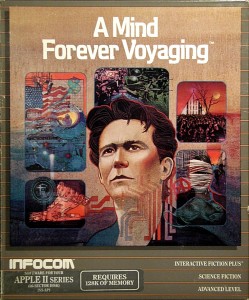Let’s begin today with the ending of A Mind Forever Voyaging, with that lengthy epilogue which we discussed last time. Not only does it present a glorious public future modeled on liberal notions of good governance, but an equally glorious personal future for Perry Simm. He and Jill remain blissfully in love, about to head off into space for their last and grandest adventure as members of the first of a dozen generations that will live out their lives aboard the colony ship Silver Dove, “mankind’s first interstellar journey.” Their son Mitchell, in this timeline a marine biologist rather than a fascist, calls to wish them bon voyage with grandchildren and great-grandchildren and in-laws arrayed behind him — a touching scene, even if it is a bit strange that neither Mitchell nor anyone else could be bothered to actually come to Rockvil to take advantage of the last chance they will ever have to see Perry and Jill in person. (I suspect old Mitchell is still a bad seed at heart.) It would all be pretty heartwarming stuff, except for one mantra I can’t seem to excise from my head when I play through it: none of this is real! What are we supposed to make of all this in that light?
The PRISM program that spawned Perry — the name it shares with the recent American mass-surveillance program is presumably coincidental, if ironic in light of the dangers about which Steve Meretzky was so desperate to warn us — is described by its founder and leading researcher, Abraham Perelman, in the edition of Dakota Online included with the game. Earlier attempts at creating artificial intelligence by laboriously coding self-awareness into a machine, he notes, all failed miserably.
“If you recall, the previous attempts had failed not because of the design of their machines, but because of their methods of inputting data.” The Vice-President nodded. “The theory behind our process was to make the programming of the machine as similar to the ‘programming’ of the human mind as possible. We would simulate EXACTLY the life experiences of a human being from the very first day of its life.
“Naturally, it was easier said than done. We had to design inputs that would precisely simulate every human sense. A cluster of five computers, each one nearly as large as PRISM itself, would be needed simply to monitor and control the simulation. Here’s an example of how this soliptic programming process works:
“It’s the earliest stage of the process, and the simulation cluster is feeding PRISM all the impressions of a six-month-old human infant. The visual is providing an image of a set of keys dangling in front of him. The aural is providing the jangling sounds. In response to this stimulus, PRISM decides to grab the keys with what his senses tell him is his tiny fist. The visual shows the tiny fist moving into view toward the keys, and then the tactile begins sending the hard, smooth, and jagged feel of the keys. Just one of a million examples that make up a single day’s worth of experiences.
“With the help of a Williams-Mennon grant, we began building PRISM and the simulation cluster in 2020, and the programming process began a year later.”
As the story opens, Perry has “lived” his first twenty years inside the simulated reality Perelman and his colleagues have so painstakingly prepared for him.
The basic idea here is one that’s been batted around AI circles for decades. It arises from an insight transcendently described by Douglas Hofstadter in Gödel, Escher, Bach: An Eternal Golden Braid a few years before A Mind Forever Voyaging‘s release and given a more practical application to AI by Marvin Minsky in The Society of Mind a few years after: that incredibly complex systems, even what we call consciousness, can emerge from the most primitive of building blocks, like a bunch of tiny neurons that can each be either on or off — or a bunch of electrical bits inside a computer that can each be in one of the same two states. We may not be able to program intelligence, but we should be able to grow it like a baby by exposing a sufficiently powerful computer to stimulus.
Or maybe not. With all due apologies to Aristotle and Thomas Aquinas, it must be said that a human baby is not a tabula rasa. She comes into the world with her pump already well primed, with lots of, if you like, programming already in place. A good example is the process of language acquisition. As Noam Chomsky has persuasively argued, babies emerge from the womb with intellects keenly honed, with lots of programming already in place, for picking up language. This ability then atrophies as early as age five. This explains why we never quite know any language as well as our mother tongue; why it’s the only one we can speak without a trace of an accent; why people like my wife who grew up with two (or more) languages are so unbelievably fortunate; why people like me who need to learn new languages later in life and aren’t preternatural linguistic geniuses like, say, James Joyce often find it to be a lifelong struggle that they can never entirely win. What equivalent can a would-be intelligent computer muster to this biological firmware? And without this nature to prime the pump, how can nurture do its thing? This is just one of the unresolved (unresolvable?) problems that PRISM presents to us who are dutifully trying to take A Mind Forever Voyaging at face value.
There’s a seemingly fanciful idea that some physicists have been discussing for some time now: that we are all actually Perry Simms, entities living inside an inconceivably huge and sophisticated simulation. When you get down to the subatomic level, our rich analog universe does seem oddly digital, ultimately made up of tiny indivisible particles (even if we’re not quite sure yet that we’ve found this tiniest and most basic building block). Less facetiously, philosopher Nick Bostrom has set forth an argument that, as such grandly conceptual arguments go, seems fairly airtight. Moore’s Law being what it is, he says, any race of intelligent beings given enough time must eventually develop the ability to simulate a universe as complex as ours inside a machine. Therefore one of three possibilities must hold true: all intelligent races somehow go extinct before they reach that point; all intelligent races decide for some reason not to continue to obsess over virtual realities the way that we humans do today; or the “real” universe, wherever and whatever it may be, is filled with countless simulated universes — very likely simulations nested within simulations nested within simulations — and our universe is almost certainly one of them.
Now let’s think about that idea within the frame of A Mind Forever Voyaging. One thing on which Bostrom and his hard-science colleagues agree is that we won’t have the computing power to even begin to contemplate such a simulation for many, many generations to come. Yet Perelman has apparently done it in 2020, using a hardware setup that sounds suspiciously like the fleet of red DEC refrigerators that powered Infocom’s development efforts. You might argue that he’s actually only simulating one mid-sized town — luckily for everyone, it seems Perry never developed a yen for travel — but, well, butterflies do flap their wings outside the borders of Rockvil, and that has its effects within the town’s borders. And of course that problematic epilogue busts those boundaries wide open by sending Perry on a journey to the stars. The simulation runs not just in real time, but in better than real time; Perry’s first twenty years required only eleven in the world outside the simulation. For the PRISM project to succeed in its goal of raising a human with all the affect and intuitive knowledge of you and me, the simulated reality must be of absolute fidelity. No crude abstractions will serve the purpose, even if they do offer a tempting excuse for the sometimes sketchy implementation of the Rockvil we encounter through our screens and keyboards. Certainly Perry never remarks that the real world of Perelman and Senator Ryder and the rest that he encounters after his “awakening” is any richer or more believable than the one he knew before, nor that its inhabitants feel any more real.
Let’s think about that last for a moment. Perry has lived for twenty years surrounded by fellow humans who apparently see and feel and talk and live and love just as he does. Here we come to the biggest paradox of all: in order to raise Perry in such realistic surroundings, in order to create the affective construct AI researchers have been dreaming of since before Colossus sprang to life, Perelman would need to be able to create not just an affective AI construct but a whole city — universe? — full of them. It’s the chicken or the egg writ large, an eternal golden braid indeed.
Given that he’s managed to create this magnificent simulated universe hundreds or thousands of years ahead of schedule, why is Perelman so obsessed with one simulated inhabitant named Perry Simm? What distinguishes Perry from anyone else being simulated, other than Perelman’s inexplicable regard? Why does Perelman need Perry to go into his own pocket universe and tell him what’s going on in there? Wouldn’t an impartial researcher be able to view the data more effectively and scientifically from outside the bubble? Did Perelman and his programmers really forget to build a user interface for their program? If so, what have they been doing in the eleven years since they started it running? For that matter, just why does everyone trust this simulation so absolutely that they’re willing to let it decide the fate of the nation by telling them what the likely outcome of Richard Ryder’s plan will be?
As Duncan Stevens noted in a comment to my last article, the most charitable reading you can give to A Mind Forever Voyaging as the piece of hard science fiction it seems to want to be is that PRISM is an elaborate scam concocted by Perelman, who’s exactly the sort of unscrupulous and devious liberal megalomaniac that partisan Republicans are accustomed to seeing behind every bush. No other reading makes any sense at all.
Things don’t make a whole lot more sense if we forget the bigger picture and just look at things from the perspective of Perry. Dakota Online mentions the “shock” and “terror” you would feel upon waking up to realize that you’re nothing but a simulated construct, but in truth Perry seems to experience very little of either. It’s all well and good to talk about a Nietzschean will to power and the forging of one’s own meaning for existence out of whole cloth if necessary, but it’s a lot easier to do that when there’s at least some degree of doubt about the fundamental nature of the universe. Confronted with the unassailable fact that the bogeyman in the closet of centuries of philosophy is in fact real, that the existence of the people I thought I knew and loved are all shams, I think I’d be a quivering mass of existential jelly for quite some years at the least. Perry just shrugs and heads off for the World News Network Feed to watch some TV.
When Perry returns to a Rockvil that he’s now well aware to be a computer simulation this knowledge doesn’t seem to affect his experience at all. When Jill is ripped from his arms by Church thugs to be dispatched to a concentration camp, he never seeks refuge in the thought that at least none of this is really happening. Much of this cognitive dissonance is perhaps down to a persistent confusion about which version of Perry we’re inhabiting — a confusion which dogs all of our experiences in Rockvil. As I noted in my last article, the Perry we control inside the simulation often possesses knowledge that the Perry from the outside world wouldn’t.
And then of course comes that epilogue, in which Perry sails off into the sunset with Jill, blissfully untroubled by the knowledge that he’s devoting the rest of his life to playing the world’s most elaborate and immersive computer game. Ironically, the same scenario has a place in A Mind Forever Voyaging‘s earlier stages. The world of 2031 is dogged by a certain amount of low-level controversy about virtual-reality entertainment systems known as “joybooths,” where a disturbing number of people are spending a disturbing amount of time. Joybooths allow them to “escape their worries, even to the point of abandoning their lives.” “Joybooth suicides” are a major thing, claiming nearly 40,000 lives every year. In the first simulated version of Rockvil that we can enter, that of 2041, Perry can experience a joybooth for himself in the local mall. He emerges with “an almost physical longing to return to your fantasy.” The game paints joybooths as a Bad Thing, one of a number of troubling portents hidden by the general economic prosperity of the early post-Plan years. Lest you doubt, consider that Richard Ryder is supported by a pro-joybooth advocacy group called The Joybooth Manufacturers of North America; anything Ryder approves of in A Mind Forever Voyaging is pretty much guaranteed to be wrong and/or evil. Yet what else does Perry do at game’s end but commit the most elaborate and expensive joybooth suicide in history? Poor Dr. Perelman and his colleagues will have to maintain the PRISM computers for decades to come so Perry can enjoy his fantasy. Or maybe not: maybe they pull the plug just as the game ends…
Now, you might say that this article descended into pointless nitpicking quite some paragraphs ago, that a certain amount of handwaving and blasé acceptance is needed to appreciate the larger message of A Mind Forever Voyaging. You might even say that A Mind Forever Voyaging is really a fable or an allegory, not a piece of realistic fiction. But it doesn’t feel like it wants to be a Pilgrim’s Progress for the modern political age. It feels like it wants to be a piece of credible, thoughtful hard science fiction. Why else include all of the backstory about the PRISM project and Perry’s origins, all of those details about AI theory?
Lest I be accused of doing nothing but carp, let me note that there are ways to fix at least some of A Mind Forever Voyaging‘s more seemingly intractable problems. Meretzky might have eliminated the whole “Perry Simm waking up to reality” angle and just cast the player as a real-world researcher experiencing the near future through the eyes of an unabashedly simulated Perry qualitatively no different from any of the other inhabitants of Rockvil. This might have cost the game some of the pathos evoked in us by poor Perry’s plight as an AI construct, but would have led to a much more coherent work of fiction. As it is, A Mind Forever Voyaging is, like these last two articles, bifurcated in intent, trying to offer both a compelling and impassioned political argument and a more thoughtful and philosophical exploration of the ramifications of virtual realities and strong AI. It succeeds to a limited extent at the former; it collapses into contradiction and nonsensicality when it comes to the latter. Perhaps because Meretzky knew he would likely get few such carte-blanche opportunities in the future, A Mind Forever Voyaging tries to do far, far too much.
But then again that very overstuffed quality is a big part of its appeal. If a proverbial Great Work is one that gets us thinking and talking and even obsessing over ramifications — even if only in reaction against much of what the work seems to be saying — then judging from the amount of virtual ink I’ve spilled on it A Mind Forever Voyaging would seem to qualify. If we’re feeling extremely kind, we might even postulate that the game is aware of all of its ironies and internal contradictions: that the juxtaposition of the joybooth-suicide plague with the epilogue, for instance, is intentional; even that it’s well aware of a possible subversive reading of Perry’s voyages into the simulated future as a conspiracy spawned by Perelman to put paid to Ryder and his Plan. This would make it a work of stunning subtlety. However, judging from everything I’ve ever heard anyone involved say about the game (which is quite a lot), I’m not buying that argument. The next question, then, is whether self-awareness or lack thereof matters. Does authorial intent trump all, or is a work of art that accidentally does what it does, even one that undermines the very arguments its author wants to make, legitimate on its own terms? Many contemporary scholars would claim the latter, and for what it’s worth I think they might be right in this case at least.
Its artistic merits aside, A Mind Forever Voyaging‘s historical importance is unimpeachable, not only as the first predominately puzzleless adventure game but as the first attempt to emphatically use the medium for something more than escapism, to say something important and immediate and real about the world around us. If we can call it a masterpiece only by grading it on a curve as steep as Mount Rushmore, well, so be it. These were early days for ludic narrative still in 1985, and it would have been a bit unrealistic to expect Steve Meretzky to crank out an Anna Karenina. That he had an A Mind Forever Voyaging in him is more than remarkable enough.














